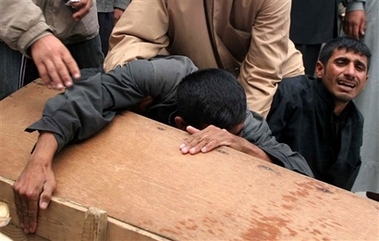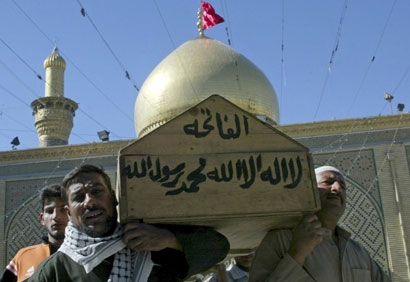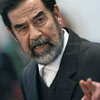Gunmen kidnap up to 150 from Baghdad building
(Reuters)Updated: 2006-11-14 16:54
Iraq's higher education minister immediately ordered all universities closed until security improvements are made, saying he was "not ready to see more professors get killed.
"I have only one choice which is to suspend classes at universities. We have no other choice," Abed Theyab told parliament. Theyab said he had repeatedly petitioned for more university security from the ministries of Defense and Interior, who command the police, but had received none.
Alaa Makki, head of the parliament's education committee, interrupted the body's session to say that between 100 and 150 people, both Shiites and Sunnis, had been abducted in the 9:30 a.m. raid.
He urged the prime minister and the defense and interior ministers to respond rapidly, calling the abductions a "national catastrophe."
The mass kidnapping is the largest since about 50 people taken from the offices of a private security company in March. Their fate remains unknown.
"It was quick operation. It took about 10 to 15 minutes," Theyab said. "It was a four-story building and the gunmen went to the four stories." He said the gunmen had at least 20 vehicles, but possibly many more.
 Iraqis grieve over a coffin of their relative during a funeral in the Shiite holy city of Najaf, 160 kilometers (100 miles) south of Baghdad, Iraq, Monday, Nov. 13, 2006. The funeral was of three brothers, Ahmed, Jassim and Maythan Abbas, killed in a suicide bomb attack at the recruiting center the previous day. [AP]  |
Makki said the gunmen had a list of names of those to be taken and claimed to be on a mission from the government's anti-corruption body to check on security ahead of a planned visit by the U.S. ambassador. Those kidnapped included the institute's deputy general directors, employees, and visitors, he said.
Police and witnesses said the gunmen, who numbered about 80, had closed off streets surrounding the Ministry of Higher Education and Scientific Research, Scholarships and Cultural Relations Directorate in the downtown Karradah district. The institute is responsible for granting scholarships to Iraqi professors and students wishing to study abroad.
The facility appeared to be an easy target for the kidnappers, whose motives remain unknown. Police spokesman Maj. Mahir Hamad said four guards put up no resistance and were unharmed.
Witnesses including a visiting female professor said the gunmen forced men and women into separate rooms, handcuffed the men, and loaded them onto pickup trucks. She said the gunmen, some masked, wore blue camouflage uniforms of the type worn by police commandos.
Shiite militias and other illegal groups are known to wear stolen or fake police and army uniforms.
Brig. Abdul-Karim Khallaf, an Interior Ministry spokesman, told The Associated Press the three people released were found unharmed along eastern Baghdad's Palestine Street. Khallaf said the police chief of the Karradah neighborhood where the kidnappings occurred has been placed under investigation along with some of his officers.
The abductions come amid a series of killings and other attacks on Iraqi academics that is prompting thousands of professors and researchers to flee to neighboring countries to escape the country's lawlessness and sectarian hatred.
Recent weeks have seen a university dean and prominent Sunni geologist murdered, bringing the death toll among educators to at least 155 since the war began. The academics apparently were singled out for their relatively high public stature, vulnerability and known views on controversial issues in a climate of deepening Islamic fundamentalism.
Ali al-Adib, a Shiite lawmaker, demanded that U.S. troops be held responsible for the security lapse and said there was "a political goal behind this grave action."
A spokesman for U.S. forces in Iraq said American troops were ready to help in the hunt for the kidnappers.
"If the reports are true, than this is a terrible crime and we will support all efforts by the Iraqi government to bring these criminals to justice," Lt. Col. Christopher Garver said.
The abductions came just hours after a U.S. assault on the northwest Baghdad Shiite district of Shula that drew strong condemnation from al-Adib and other Shiite members of parliament. Shula is a stronghold of radical anti-American Shiite cleric Muqtada al-Sadr, sponsor of one of Iraq's most powerful and feared militias, the Mahdi Army.
It also came a day after Gen. John Abizaid, head of the U.S. Central Command, confronted Prime Minister Nouri al-Maliki over how Iraqi forces would halt the raging violence.
|
||
|
||
|
|


